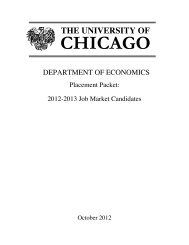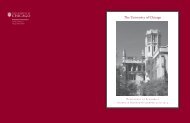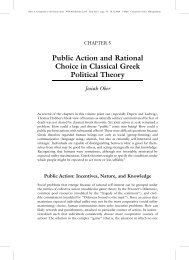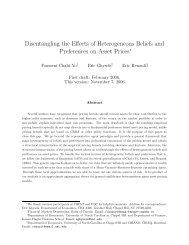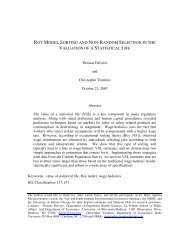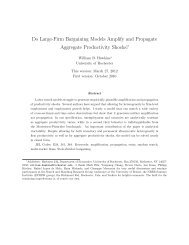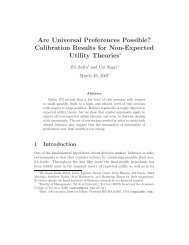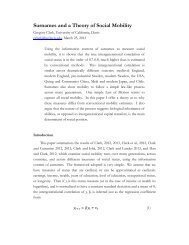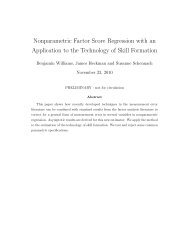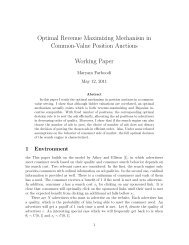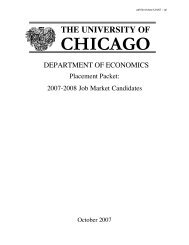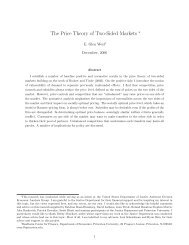CHICAGO - University of Chicago Department of Economics
CHICAGO - University of Chicago Department of Economics
CHICAGO - University of Chicago Department of Economics
Create successful ePaper yourself
Turn your PDF publications into a flip-book with our unique Google optimized e-Paper software.
THE UNIVERSITY OF<br />
<strong>CHICAGO</strong><br />
DEPARTMENT OF ECONOMICS<br />
Placement Packet:<br />
2008-2009 Job Market Candidates<br />
October 2008<br />
(revised 12/05/08)
PRIMARY/SECONDARY FIELDS<br />
2008-2009<br />
Job Market Candidates<br />
by Field<br />
Applied Econometrics<br />
Applied Microeconomics / Price Theory<br />
Computational <strong>Economics</strong><br />
Contract Theory<br />
Corporate Finance<br />
Development<br />
Econometrics<br />
Economic History<br />
AKKUS, Oktay S S S P X X X<br />
BASU, Karna P P P X X X<br />
BRUZE, Gustaf S S P X X X<br />
DAMRAKS, Tanapoom S S S P P P X X X<br />
DECAROLIS, Francesco S P S S P S S X X X<br />
GARCIA-VERDU, Santiago S S P P X X X<br />
GETE, Pedro S S P P X X X<br />
GORRY, Aspen S S S P S X X X<br />
HONG, Sok Chul P P P P X X X<br />
KIM, Kun-Ho P P S S X X X<br />
MOON, Seong Hyeok P S S P X X X<br />
NAVA, Francesco S P P P S S X X X<br />
NISHIDA, Mitsukuni S S P P P S X X X<br />
OZDAGLI, Ali K. P S P X X<br />
RIVADENEYRA, Francisco S P X X<br />
WAGNER, Mathis P S S P S X X<br />
WANG, Yong P P P S P P S X X X<br />
Economic Theory / Mathematical Econ<br />
Environmental/ Natural Resource/ Urban <strong>Economics</strong><br />
Experimental <strong>Economics</strong><br />
Finance / Financial <strong>Economics</strong><br />
Growth<br />
Health <strong>Economics</strong><br />
Industrial Organization / Theory <strong>of</strong> the Firm<br />
International <strong>Economics</strong><br />
Labor / Human Capital<br />
Law & <strong>Economics</strong> / Political Economy<br />
Macroeconomics / Money & Banking<br />
Population <strong>Economics</strong> / Demography<br />
Public Finance / Public Sector<br />
Other<br />
Private Sector<br />
Public Sector<br />
Academic Sector<br />
revised 12/05/08 - jal<br />
Page 1
Oktay Akkus<br />
1215 E. Hyde Park Blvd. Apt. 410 akkus@uchicago.edu<br />
<strong>Chicago</strong>, IL 60615<br />
http://home.uchicago.edu/~akkus<br />
Cell: (773) 620-0455<br />
Education Ph.D. <strong>Economics</strong> <strong>University</strong> <strong>of</strong> <strong>Chicago</strong> (expected June 2009)<br />
M.A. <strong>Economics</strong> <strong>University</strong> <strong>of</strong> <strong>Chicago</strong> 2004<br />
M.A. <strong>Economics</strong> Sabanci <strong>University</strong>, Turkey 2002<br />
B.S. Industrial Engineering Marmara <strong>University</strong>, Turkey 2000<br />
Fields<br />
Primary: Industrial Organization<br />
Secondary: Corporate Finance, Applied Econometrics, Computational <strong>Economics</strong><br />
Job Market “Endogenous Matching and the Determinants <strong>of</strong> Underpricing in IPO Markets” 2008<br />
Paper Underpricing <strong>of</strong> initial public <strong>of</strong>ferings, defined by the first-day closing price being higher than the<br />
issue price, is a well-documented phenomenon that has been studied extensively in the finance<br />
literature. These prior studies have analyzed underpricing only through reduced form regressions<br />
on the observed characteristics <strong>of</strong> the issuer firms and the underwriters. Such an approach,<br />
however, yields biased estimates if some <strong>of</strong> the characteristics are not perfectly observed and there<br />
is endogenous matching between the issuers and the underwriters based on both the observed and<br />
unobserved characteristics. This paper solves the biased estimation problem by putting the IPO<br />
process into a two-sided matching framework, and using a novel econometric method to control<br />
for the endogenous matching. This methodological improvement brings computational ease and<br />
flexibility that allows the use <strong>of</strong> bank-specific fixed effects to analyze the preferences <strong>of</strong> match<br />
partners rigorously; which, in turn, enables the separation <strong>of</strong> the market equilibrium sorting effect<br />
and the direct influence <strong>of</strong> the match partners’ characteristics on underpricing. The analysis <strong>of</strong> the<br />
matching shows that underwriters’ total and industry-specific experiences are the most significant<br />
factors in issuer firms’ preferences, while the underwriters prefer bigger and venture-backed firms.<br />
According to the resulting decomposition, only two-thirds <strong>of</strong> the underwriter reputation effect,<br />
which is among the most emphasized determinants <strong>of</strong> underpricing in the literature, is accounted<br />
for by the direct influence.<br />
Secondary “Determinants <strong>of</strong> Bank Mergers: A Revealed Preference Analysis”, with Ali Hortacsu 2007<br />
Paper This paper analyzes bank mergers in a two-sided matching framework with endogenous transfers,<br />
where the two sides are formed by buyers and targets. When a buyer is matched with a target,<br />
there is a value created by this match. We impose a functional form for this value and estimate it<br />
by employing two maximum score estimators: one that uses transfer data, and one that does not.<br />
Our semi-parametric estimates show that the relative sizes <strong>of</strong> both assets and branches for each<br />
side <strong>of</strong> the match do matter. The closer these values for a matching pair are, the higher the value<br />
created. Secondly, geographical proximity, such as the buyer's and the target's branches being in<br />
the same markets or in neighboring markets, increases the value. Moreover, same market mergers<br />
obtain higher values than neighboring market mergers. Finally, at the time <strong>of</strong> the announcement <strong>of</strong><br />
the merger, mergers resulting in Antitrust violation <strong>of</strong> the post-merger local market concentration<br />
have lower values.<br />
Academic RA for Pr<strong>of</strong>. Ali Hortacsu<br />
Experience TA: Industrial Organization, Microeconomics, Game Theory, Public Finance 2005-2008<br />
Presentations Midwest Economic Association Conference, Minneapolis March 2007<br />
International Industrial Organization Conference, Savannah April 2007<br />
<strong>University</strong> <strong>of</strong> <strong>Chicago</strong>, Industrial Organization Seminar August 2006, November 2007<br />
November 2008 (scheduled)<br />
Referee<br />
International Journal <strong>of</strong> Industrial Organization<br />
Honors & Esther and T. W. Schultz Dissertation Fellowship 2007-2008<br />
Awards Social Sciences Division Fellowship 2002-2006<br />
Top-ranking graduate among all engineering students in Marmara <strong>University</strong> 2000<br />
References Ali Hortacsu (Chair) (773) 702-8250 hortacsu@uchicago.edu<br />
Jeremy Fox (773) 702-7587 fox@uchicago.edu<br />
Chad Syverson (773) 702-7815 chad.syverson@chicagogsb.edu
KARNA BASU<br />
<strong>Department</strong> <strong>of</strong> <strong>Economics</strong><br />
The <strong>University</strong> <strong>of</strong> <strong>Chicago</strong><br />
1126 E. 59th St.<br />
<strong>Chicago</strong>, IL 60637<br />
karna@uchicago.edu<br />
http://home.uchicago.edu/~karna<br />
(c) 1-617-642-4918 (w) 1-773-702-9014<br />
CURRENT EMPLOYMENT<br />
UNIVERSITY OF <strong>CHICAGO</strong>, <strong>Chicago</strong>, IL, USA<br />
Postdoctoral Fellow & Instructor, <strong>Department</strong> <strong>of</strong> <strong>Economics</strong>, 2006-2009<br />
EDUCATION<br />
MASSACHUSETTS INSTITUTE OF TECHNOLOGY, Cambridge, MA, USA<br />
Ph.D., <strong>Economics</strong>, 2006<br />
YALE UNIVERSITY, New Haven, CT, USA<br />
B.A., <strong>Economics</strong> and Mathematics, cum laude, 2000<br />
RESEARCH AND TEACHING AREAS<br />
Development <strong>Economics</strong>, Behavioral <strong>Economics</strong>, Applied Microeconomic Theory<br />
PAPERS (abstracts and full papers available on my website)<br />
• “Renegotiating with One’s Self”<br />
• “The Provision <strong>of</strong> Commitment in Informal Banking Markets: Implications for Takeup and<br />
Welfare”<br />
• “Hyperbolic Discounting and the Sustainability <strong>of</strong> Rotational Savings Arrangements” (under<br />
review)<br />
• “A Behavioral Model <strong>of</strong> Simultaneous Borrowing and Saving” (under review)<br />
• “Seasonality in Consumption: Evidence from a Field Experiment in Eastern Indonesia” (in<br />
progress, with Maisy Wong)<br />
• “Social Networks and Micr<strong>of</strong>inance” (in progress, with Abhijit Banerjee, Esther Duflo, and<br />
Matthew Jackson)<br />
TEACHING EXPERIENCE<br />
<strong>University</strong> <strong>of</strong> <strong>Chicago</strong>: Theoretical Models <strong>of</strong> Development (Graduate, joint with Roger Myerson)<br />
Intermediate Microeconomics (Undergraduate)<br />
Topics in Development and Economic Growth (Undergraduate)<br />
MIT:<br />
Introductory and Intermediate Microeconomics (Undergraduate)<br />
Applied <strong>Economics</strong> for Managers (Sloan School <strong>of</strong> Management, Tutor)<br />
Environmental Policy and <strong>Economics</strong> (Undergraduate, Teaching Assistant)<br />
HONORS, SCHOLARSHIPS, AND FELLOWSHIPS<br />
2006 – present: Short Term Consultant, The World Bank<br />
2008: NSF research grant (with Abhijit Banerjee, Esther Duflo, and Matthew Jackson)<br />
2007: Research grant from “Japanese Social Development Fund” (with Maisy Wong)<br />
Summer 2004: Selected Participant, Summer Institute in Behavioral <strong>Economics</strong>, Trento, Italy<br />
2000 – 2002: MIT <strong>Department</strong> <strong>of</strong> <strong>Economics</strong> Fellowship<br />
2000: Distinction in <strong>Economics</strong> and Mathematics, Yale <strong>University</strong><br />
REFERENCES<br />
Abhijit Banerjee Dept. <strong>of</strong> <strong>Economics</strong>, MIT banerjee@mit.edu 617-253-8855<br />
Xavier Gabaix Stern School <strong>of</strong> Business, NYU xgabaix@stern.nyu.edu 212-998-0257<br />
Roger Myerson Dept. <strong>of</strong> <strong>Economics</strong>, U. <strong>Chicago</strong> myerson@uchicago.edu 773-834-9071
GUSTAF BRUZE<br />
5330 S. Blackstone Avenue gustaf@uchicago.edu<br />
<strong>Chicago</strong>, IL 60615 Home phone: (773) 752 2578<br />
NATIONALITY<br />
Swedish<br />
EDUCATION Ph.D. <strong>Economics</strong> <strong>University</strong> <strong>of</strong> <strong>Chicago</strong> Expected June 2009<br />
B. Sc. Mathematics Stockholm <strong>University</strong> 2001<br />
M. Sc. <strong>Economics</strong> Stockholm School <strong>of</strong> <strong>Economics</strong> 2000<br />
FIELDS Primary: Labor / Human Capital<br />
Secondary: Growth, Development<br />
JOB MARKET<br />
PAPER<br />
“Schooling, Marriage, and Male and Female Consumption”<br />
A marriage matching model is estimated to quantify the share <strong>of</strong> returns to<br />
education that is realized through marriage. In the model, more educated agents<br />
earn higher wages in the labor market, and are more productive in housework.<br />
Men and women who marry benefit from the presence <strong>of</strong> household public goods,<br />
complementarities in household production, and the division <strong>of</strong> labor between<br />
spouses. The predictions <strong>of</strong> the model are matched with 1980 census data on<br />
sorting in marriage, and data on the allocation <strong>of</strong> time from a time use study.<br />
Counterfactual analysis for men and women, suggests that better marital<br />
outcomes generate 65 percent <strong>of</strong> the return to education for women around middle<br />
age and 20 percent <strong>of</strong> the corresponding return for men.<br />
OTHER PAPERS “What Causes Positive Sorting on Education in Marriage? Evidence from a Social<br />
Experiment”<br />
TEACHING TA, Undergraduate Macroeconomics Chad Syverson 2003<br />
EXPERIENCE TA, Undergraduate Microeconomics Omar Al-Ubaydli 2004<br />
TA, Undergraduate Microeconomics Vicor Lima 2006<br />
TA, American Economic History David Galenson 2004-07<br />
REFERENCES Casey Mulligan (joint chairman) (773) 702 9017 c-mulligan@uchicago.edu<br />
Ali Hortaçsu (joint chairman) (773) 702 5841 hortacsu@uchicago.edu<br />
Jeremy Fox<br />
(773) 702 4862 fox@uchicago.edu
TANAPOOM DAMRAKS<br />
5500 S Shore Dr Apt 1508, <strong>Chicago</strong>, IL 60637 Tel. (773) 733-1395<br />
tanapoom@uchicago.edu<br />
EDUCATION<br />
Ph.D. in <strong>Economics</strong> UNIVERSITY OF <strong>CHICAGO</strong> (expected) June 2009<br />
M.A. in <strong>Economics</strong> UNIVERSITY OF <strong>CHICAGO</strong> 2006<br />
M.S. in Computer Networks UNIVERSITY OF TOKYO, Japan 2004<br />
B.S. in Electrical Engineering, Summa Cum Laude CHULALONGKORN UNIVERSITY, Thailand 2001<br />
CFA Level III candidate<br />
FIELDS<br />
Primary: Finance/Asset Pricing, Industrial Organization, Macroeconomics<br />
Secondary: Computational <strong>Economics</strong>, Contract Theory<br />
PAPERS<br />
“Corporate Investment Structures in Dynamic Mechanism Design” (dissertation)<br />
This paper analyzes how an optimal business organizational structure can be formed. Using mechanism design and<br />
contract theory framework, I compare two types <strong>of</strong> organizations, hierarchical structure and distributional structure.<br />
Hierarchical structure benefits by mutual monitoring among agents, while distributional structure can avoid collusive<br />
strategies among agents. Optimal structure and contract are found by solving this model numerically with Matlab.<br />
“Bank Lending and Relative Performance” joint with Jose M. Liberti and Robert M. Townsend<br />
We study supply side <strong>of</strong> money lending business <strong>of</strong> a large international bank in Argentina. By disentangling the<br />
macroeconomic/industry-wide aggregate shock, we prove whether the bank makes decision about lending based on<br />
individual basis or by comparing performance <strong>of</strong> two firms. Both theoretical and empirical models are implemented.<br />
“Liquidity Premium in Fixed Income Securities”<br />
I constructed a measure <strong>of</strong> market-wide liquidity and utilized factor model to predict return <strong>of</strong> fixed income<br />
securities based on sensitivity <strong>of</strong> return to market-wide liquidity. Result suggests that liquidity is an important factor in<br />
pricing <strong>of</strong> fixed income securities.<br />
WORK EXPERIENCES<br />
• MERRILL LYNCH & CO., INC., New York, Associate, Global Fixed-Income & Equity-Linked Research 2008<br />
-Global Derivatives & Commodities Research: developed econometric model and analyzed fundamental market and<br />
macroeconomic data to predict petroleum product prices and volatility.<br />
-US Rates & Structured Credit Research: analyzed past delinquency and fundamental data to predict default rate in<br />
Mortgage-Backed Securities (MBS) and Asset-Backed Securities (ABS) market.<br />
-Credit Derivatives Research: developed model to improve pricing <strong>of</strong> CDX & iTraxx tranches. Solved problems <strong>of</strong><br />
Gaussian Copula model such as negative delta & high base correlation <strong>of</strong> senior tranches.<br />
• UNIVERSITY OF <strong>CHICAGO</strong>, Research Assistant for Pr<strong>of</strong>essor Robert M. Townsend 2005-2008<br />
-Developed financial models to predict the effect <strong>of</strong> Moral Hazard and Agency problems in financial markets. Simulated<br />
and solved models using MATLAB.<br />
• J.P. MORGAN SECURITIES, Tokyo, Japan, Associate, Quantitative Research/Trading 2007<br />
-Derivatives Research: developed and tested Tree/Finite Difference/Monte Carlo pricing models for new products in<br />
equity/rate exotics and hybrids.<br />
-Equity Derivatives Quantitative Strategy: designed and tested automated trading system and market timing strategies.<br />
Constructed trading strategies that outperform market index for 14% on average during the last 7 years.<br />
• UNIVERSITY OF TOKYO, Japan , Researcher, Advanced Information and Networking Lab 2001-2002<br />
-Developed algorithms for efficient data transfer. Constructed models using C language. Simulated data network models.<br />
• SIEMENS LTD., Bangkok, Thailand, Project Engineer 2000<br />
-Project Engineer <strong>of</strong> the Skytrain Project: designed and installed the fire alarm system <strong>of</strong> 3 stations.<br />
AWARDS AND HONORS<br />
-Henry Morgenthau Jr. Memorial Fund Dissertation Fellowship 2008-2009<br />
-<strong>University</strong> <strong>of</strong> <strong>Chicago</strong>, <strong>Department</strong> <strong>of</strong> <strong>Economics</strong> Scholarship (full tuition + stipend) 2004-2008<br />
-Best Paper Award, Institute <strong>of</strong> Electronics, Information and Communication Engineers (IEICE) 2003<br />
-Japanese Government Scholarship (full tuition + stipend) 2001-2003<br />
-Excellent Academic Record Awards (eight times consecutively), Chulalongkorn <strong>University</strong> 1997-2001<br />
OTHER PUBLICATION<br />
“Mobility Support for IEEE 802.11 Power Saving Terminal across Access Points Running TCP Proxy,” Institute <strong>of</strong><br />
Electronics, Information and Communication Engineers (IEICE), September 2003. Winner <strong>of</strong> the Best Paper Award.<br />
SELECTED SKILLS<br />
Languages : Fluent in Japanese and Thai.<br />
Computer : Simulation using MATLAB, VBA, STATA. Micros<strong>of</strong>t Word, Excel, PowerPoint. Basic knowledge <strong>of</strong> C.<br />
REFERENCES<br />
Robert M. Townsend (chair) MIT, <strong>Economics</strong> (617) 452-3722 rtownsen@mit.edu<br />
Roger B. Myerson <strong>University</strong> <strong>of</strong> <strong>Chicago</strong>, <strong>Economics</strong> (773) 702-6576 myerson@uchicago.edu<br />
Milton Harris <strong>University</strong> <strong>of</strong> <strong>Chicago</strong>, GSB (773) 702-2549 fmharris@chicagogsb.edu
FRANCESCO DECAROLIS<br />
5633 South Kenwood Ave. fdc@uchicago.edu<br />
<strong>Chicago</strong>, IL 60637<br />
http://home.uchicago.edu/~fdc<br />
Citizenship: Italy (F1 Visa) Tel. 773 - 6271075 / 6677455<br />
EDUCATION<br />
PhD in <strong>Economics</strong>, The <strong>University</strong> <strong>of</strong> <strong>Chicago</strong> Expected June 2009<br />
Thesis advisor: Pr<strong>of</strong>essor Ali Hortacsu. Thesis title: “Essays on Public Procurement”<br />
M.A. in <strong>Economics</strong>, The <strong>University</strong> <strong>of</strong> <strong>Chicago</strong> 2004<br />
B.A. in <strong>Economics</strong>, Università Bocconi (Italy) 2002<br />
Undergraduate thesis advisor: Pr<strong>of</strong>essor Guido Tabellini. Final grade <strong>of</strong> 110/110 summa cum laude<br />
RESEARCH AND TEACHING INTERESTS<br />
Industrial organization (Empirical and Theoretical), Economic Theory, Political Economy<br />
JOB MARKET PAPER: “When the Highest Bidder Loses the Auction: Theory and Evidence from Public Procurement”<br />
When bids do not represent binding commitments, the use <strong>of</strong> a first price sealed bid auction favours those bidders that are less<br />
penalized from reneging their bid. These bidders are the most likely to win but also to default on their bid. In this paper I analyze<br />
two methods <strong>of</strong>ten used in public procurement to deal with this problem: (1) augmenting the first price auction with an ex-post<br />
verification <strong>of</strong> the responsiveness <strong>of</strong> the bids and (2) using an average bid auction in which the winner is the bidder whose bid is<br />
the closest to the simple average <strong>of</strong> all the bids. The average bid auction is new to <strong>Economics</strong> but has been proposed by the Civil<br />
Engineering literature. I show that when bidders are asymmetric in their penalty for defaulting and their valuations have a<br />
predominant common component, the average bid auction is preferred over the standard first price by an auctioneer who bears a<br />
high enough cost due to the winner's insolvency. Depending on the cost <strong>of</strong> the ex-post verification, the average bid auction can be<br />
dominated by the augmented first price. I use a new dataset <strong>of</strong> Italian public procurement auctions, run alternately using a form <strong>of</strong><br />
the average bid auction or the augmented first price, to estimate semiparametrically the firms’ costs and use them to compute the<br />
firms’ mark up, the auctioneers’ implied verification cost and the inefficiency generated by the average bid auctions.<br />
WORKING PAPERS & RESEARCH IN PROGRESS<br />
“An Analysis <strong>of</strong> Collusion in Average Bid Auctions”<br />
(In progress)<br />
“The effects <strong>of</strong> the Emissions Trading Scheme on Electricity Price in Three European Countries”<br />
(In progress)<br />
“Homotopy Continuation Methods: An Algorithm for the Fixed Point and Newton Homotopy Methods with 2005<br />
Some Examples”. Joint with R. Mayer and M. Santamaria. Downloadable Code: http://home.uchicago.edu/~fdc/decarolis-research.htm<br />
PUBLICATIONS<br />
“Economic Effects <strong>of</strong> Democracy. An Empirical Analysis”. Rivista di Politica Economica, Dec, 2003, pp. 69 - 116.<br />
Winning paper: - Young Economist Award, European Economic Association<br />
- Angelo Costa Award, Rivista di Politica Economica (Best Italian BA thesis in <strong>Economics</strong>)<br />
FELLOWSHIPS & SCHOLARSHIPS<br />
Economic Research Fellowship, Bank <strong>of</strong> Italy 2008-2009<br />
Henry Morgenthau, Memorial Fund, <strong>University</strong> <strong>of</strong> <strong>Chicago</strong>, <strong>Economics</strong> Dept. Dissertation Fellowship 2007-2008<br />
<strong>University</strong> Unendowed Fellowship/Scholarship, <strong>University</strong> <strong>of</strong> <strong>Chicago</strong> 2003-2007<br />
Felice Gianani Scholarship, Associazione Bancaria Italiana 2005-2006<br />
Post-Graduate Scholarship, Univesità Bocconi 2003-2005<br />
TEACHING & REFEREE EXPERIENCE<br />
Competitive Strategy. (<strong>Chicago</strong> GSB) Teaching assistant for Pr<strong>of</strong>essor Marianne Bertrand 2007<br />
Game Theory and Economic Applications. (College) Teaching assistant for Pr<strong>of</strong>essor Roger Myerson 2006<br />
Referee for: International Journal <strong>of</strong> Industrial Organization, Rivista di Politica Economica<br />
PROFESSIONAL EXPERIENCE<br />
NERA Economic Consulting, Italy. Internship. 2007<br />
Italian Public Procurement Agency (Consip s.p.a), Italy. Internship. 2006<br />
Organisation for Economic Co-operation and Development (OECD), France. Trainee. 2003<br />
PRESENTATIONS<br />
CONFERENCES: Econometric Society Summer Meeting (2008), European Economic Association Annual Congress (2004,<br />
2008), International Industrial Organization Conference (2008), European Association for Research in Industrial <strong>Economics</strong><br />
(2008). WORKSHOPS (<strong>Chicago</strong>): Applications <strong>of</strong> <strong>Economics</strong>, IO Lunch Seminar, Economic Theory Working Group<br />
SKILLS<br />
Languages: Italian (Mother Tongue). English (Excellent). French (Good Knowledge). Spanish (Basic Knowledge)<br />
Computing: Windows; Micros<strong>of</strong>t Office; Internet; HTML; EViews; STATA; MATLAB; LaTeX; Ruby<br />
THESIS COMMITTEE<br />
Pr<strong>of</strong>. Ali Hortacsu (Chair) hortacsu@uchicago.edu 773-702-8250<br />
Pr<strong>of</strong>. Roger B. Myerson myerson@uchicago.edu 773-702-6576<br />
Pr<strong>of</strong>. Philip J. Reny preny@uchicago.edu 773-702-2417<br />
Pr<strong>of</strong>. Timothy G. Conley tim.conley@chicagogsb.edu 773-702-7281
Santiago Garcia-Verdu<br />
63 E Lake St Apt 802 <strong>Chicago</strong>, IL 60601<br />
Tel. (773) 684-0362 · E-mail: sgarciav@uchicago.edu<br />
http://home.uchicago.edu/~sgarciav/<br />
Education<br />
Fields<br />
Ph.D., <strong>Economics</strong>, <strong>University</strong> <strong>of</strong> <strong>Chicago</strong>, 2009 (expected)<br />
M.E., Financial Engineering, Princeton <strong>University</strong>, 2001<br />
M.A., <strong>Economics</strong> (highest honors), Instituto Tecnológico Autónomo de México (ITAM), 2000<br />
B.Sc., Applied Mathematics (honors), ITAM 1999<br />
Primary: Financial <strong>Economics</strong> and Monetary <strong>Economics</strong><br />
Secondary: Computational <strong>Economics</strong> and Econometrics<br />
Job Market Paper<br />
Equilibrium Yield Curves Under Regime Switching<br />
An unexpected increase in inflation affects yields in two ways. Directly, by decreasing the real component <strong>of</strong> the yields.<br />
Indirectly, by changing the yields as a risk-compensation to the extent it is a prelude <strong>of</strong> bad times. Thus, distinguishing<br />
between transient and long lasting changes in inflation and consumption growth is central to assess their effects on the<br />
yield curve. I develop, estimate and test a consumption-based asset pricing model to obtain yields under different<br />
specifications <strong>of</strong> a state-space model capturing consumption growth and inflation dynamics. To draw a distinction<br />
between the temporality <strong>of</strong> changes, I introduce unobservable components and regimes switching in the state-space<br />
model. Epstein-Zin preferences in turn capture the intertemporal distribution <strong>of</strong> risk. These two are key elements to<br />
introduce variability in the stochastic discount factor. I find that the implied yields with a coefficient <strong>of</strong> risk aversion<br />
between 5 to 30, depending on the exact specification, and a subjective discount factor <strong>of</strong> around 0.998 can capture<br />
central stylized facts including a consistent principal component decomposition and key features on yields' predictability.<br />
Work Experience Banco de México (Central Bank <strong>of</strong> Mexico), Visiting Economist, August 2008-September 2008<br />
Pemex, Deputy Manager, Mexico City, Mexico, July 2002-August 2003<br />
Algorithmics Incorporated, Associate Consultant, Mexico City, Mexico, August 2001-June 2002<br />
Academic Experience ITAM, Lecturer, M.Sc. in Finance, April 2003-June 2003<br />
Center for <strong>Economics</strong> Research (CIE), ITAM, Research and teaching assistant for Pr<strong>of</strong>essor<br />
Alejandro Hernandez Delgado, January 1999-June 2000<br />
Presentations<br />
Awards<br />
Working Papers<br />
Languages<br />
References<br />
Economic Dynamics Working Group, <strong>University</strong> <strong>of</strong> <strong>Chicago</strong> (2006-2008), Instituto<br />
Tecnológico Autónomo de México, (ITAM) (2008), Central Bank <strong>of</strong> Mexico (2008), The 3rd<br />
Mexican Energy Roundtable Business Meeting (2003), N.Y.<br />
Homer and Alice Hanson Jones Fellowship, <strong>University</strong> <strong>of</strong> <strong>Chicago</strong>, 2008-2009, Graduate<br />
Scholarship, Fulbright-Garcia-Robles, Comexus, 2003 –2006, Graduate Scholarship,<br />
CONACYT, Mexico, 2003 – 2008, Graduate Fellowship, Central Bank <strong>of</strong> Mexico, 2003 – 2008,<br />
CONSAR 3rd Best paper on Pension Fund Research, 2006<br />
Real returns and the inflation risk premium, Central Bank <strong>of</strong> Mexico, Working Paper<br />
Computational results for Cash-in-Advance Monetary Models<br />
Monetary Policy and the Term structure <strong>of</strong> interest rates: the case <strong>of</strong> Mexico<br />
Exogenous shocks to income and consumption-risk sharing<br />
Spanish (native), English (pr<strong>of</strong>icient), and basic French and Italian<br />
Pr<strong>of</strong>essor Lars P. Hansen, (chair), (773) 702-8170, l-hansen@uchicago.edu,<br />
<strong>Department</strong> <strong>of</strong> <strong>Economics</strong>, <strong>University</strong> <strong>of</strong> <strong>Chicago</strong><br />
Pr<strong>of</strong>essor Monika Piazzesi, (650) 723-9289, piazzesi@stanford.edu,<br />
<strong>Department</strong> <strong>of</strong> <strong>Economics</strong>, Stanford <strong>University</strong><br />
Pr<strong>of</strong>essor Fernando Alvarez, (773) 702-4412, f-alvarez1@uchicago.edu,<br />
<strong>Department</strong> <strong>of</strong> <strong>Economics</strong>, <strong>University</strong> <strong>of</strong> <strong>Chicago</strong>
5330 S. Blackstone Av. Apt.311<br />
<strong>Chicago</strong>, IL 60615<br />
773-273-0127<br />
PEDRO GETE<br />
pgete@uchicago.edu<br />
http://home.uchicago.edu/~pgete<br />
Education Ph.D. in <strong>Economics</strong> <strong>University</strong> <strong>of</strong> <strong>Chicago</strong> Expected June 2009<br />
M.A. in <strong>Economics</strong> <strong>University</strong> <strong>of</strong> <strong>Chicago</strong> June 2004<br />
J.D. Universidad Carlos III, Madrid, Spain June 2002<br />
B.A. in <strong>Economics</strong> Universidad Carlos III, Madrid, Spain June 2002<br />
Fields<br />
Job market<br />
paper<br />
Working paper<br />
Macroeconomics, International Finance, Monetary economics<br />
“Housing Markets and Current Account Dynamics”<br />
I model global imbalances as arising from changes in preferences for housing relative to tradable goods. The key<br />
ingredients in the model are labor reallocation across sectors and consumption smoothing between housing and<br />
tradable goods. Countries import goods during periods when more domestic labor is devoted to housing<br />
construction. Housing booms are larger and more persistent in countries that can run trade deficits. This occurs<br />
despite the absence <strong>of</strong> wealth effects, and even if trade is not primarily concentrated in capital goods. I provide<br />
several types <strong>of</strong> evidence to support the theory: First, over the last decade housing variables have decoupled from<br />
the business cycle while consumption and consumer durables have not. Second, for the same period there is a<br />
strong cross country correlation between housing variables and current account dynamics. Third, a parameterized<br />
version <strong>of</strong> the model generates cross section correlation between the labor share employed in construction (or<br />
value added from the construction sector) and the trade balance which is consistent with recent global imbalances.<br />
Fourth, I use sign restrictions implied by the model to estimate a vector autoregression and identify the effects <strong>of</strong><br />
housing specific shocks on the U.S. trade deficit. The results imply that housing shocks are an important driving<br />
force <strong>of</strong> current account dynamics.<br />
“Savings, Investment and Endogenous Fertility under Uncertainty” (work in progress)<br />
Presentations Macro/International Workshop, <strong>University</strong> <strong>of</strong> <strong>Chicago</strong>-GSB. October 2008<br />
Board <strong>of</strong> Governors <strong>of</strong> the Federal Reserve. Washington D.C. July 2008<br />
Economic Dynamics, Capital Theory Working groups, The <strong>University</strong> <strong>of</strong> <strong>Chicago</strong>. 2006, 2007, 2008<br />
Research<br />
experience<br />
Teaching<br />
experience<br />
Dissertation Internship. Board <strong>of</strong> Governors <strong>of</strong> the Federal Reserve. Summer 2008<br />
Internship. Bank <strong>of</strong> Spain. Madrid, Spain. Summer 2006<br />
Research Assistant for Anil Kashyap, The <strong>University</strong> <strong>of</strong> <strong>Chicago</strong>. 2006, 2007 and 2008<br />
Research Assistant for Monika Piazzesi, The <strong>University</strong> <strong>of</strong> <strong>Chicago</strong>. 2005 and 2006<br />
MBA courses at <strong>University</strong> <strong>of</strong> <strong>Chicago</strong> Graduate School <strong>of</strong> Business:<br />
Understanding Central Banking (Assistant for Anil Kashyap). Spring 2006 and 2008, Fall 2007<br />
Macroeconomics (Assistant for Veronica Guerrieri). Winter 2008<br />
College Courses at Universidad Carlos III de Madrid, Spain:<br />
Macroeconomics I and II (Assistant for Silvio Rendon and Juan Ruiz). 2002- 2003<br />
Microeconomics (Assistant for Pedro Albarran). 2002- 2003<br />
Awards Harper Dissertation Fellowship. Social Sciences Division. <strong>University</strong> <strong>of</strong> <strong>Chicago</strong>. 2008-09<br />
Margaret Reid Dissertation Fellowship. <strong>Department</strong> <strong>of</strong> <strong>Economics</strong>. <strong>University</strong> <strong>of</strong> <strong>Chicago</strong>. 2007-08<br />
NBER Summer Institute Monetary <strong>Economics</strong>, invited graduate student (Doolittle grant). 2007<br />
Bank <strong>of</strong> Spain Fellowship. 2005-2007<br />
La Caixa Foundation Fellowship. 2003-2005<br />
Middlebury College French School Fellowship. Summer 1999<br />
Languages and<br />
Computer skills<br />
Spanish (native language), English and French (fluent)<br />
AMPL, Dynare, E-Views, Matlab, Stata<br />
References Anil Kashyap (Co-chair), <strong>University</strong> <strong>of</strong> <strong>Chicago</strong>-GSB 773 702 1235<br />
Monika Piazzesi (Co-chair), Stanford <strong>University</strong> 650 723 9289<br />
Samuel Kortum, <strong>University</strong> <strong>of</strong> <strong>Chicago</strong> 773 702 8251<br />
anil.kashyap@chicagogsb.edu<br />
piazzesi@stanford.edu<br />
kortum@uchicago.edu
Aspen Gorry<br />
1530 East 59 th Street • <strong>Chicago</strong>, IL 60637<br />
aspen@uchicago.edu • http://home.uchicago.edu/~aspen • Phone: (602) 885-8856<br />
EDUCATION Ph.D. <strong>Economics</strong>, <strong>University</strong> <strong>of</strong> <strong>Chicago</strong> (Expected) 2009<br />
M.A. <strong>Economics</strong>, <strong>University</strong> <strong>of</strong> <strong>Chicago</strong> 2006<br />
B.S. <strong>Economics</strong> and B.S. Mathematics, Arizona State <strong>University</strong>, Summa Cum Laude 2004<br />
FIELDS<br />
Primary: Macroeconomics / Money and Banking<br />
Secondary: Economic Growth, International Trade, Public Finance, Labor / Human Capital<br />
JOB MARKET “Experience and Labor Market Flows” 2008<br />
PAPER<br />
This paper presents a model <strong>of</strong> learning where labor market experience provides information<br />
about the quality <strong>of</strong> future job matches. While previous models <strong>of</strong> learning focus on the effects<br />
<strong>of</strong> workers' productivity while employed, learning is also important to understand workers'<br />
search behavior while unemployed. When past experience provides a signal about job quality,<br />
the model can explain the decline in both job finding and separation rates found in the data.<br />
Models without learning cannot account for any decline in finding rates. Beyond accounting<br />
for labor market flows, the model gives predictions that are consistent with observed empirical<br />
wage distributions. Finally, I evaluate the effects <strong>of</strong> minimum wages on labor outcomes and<br />
find that the endogenous decline in job finding rates is essential to understand high<br />
unemployment rates for young workers subjected to minimum wages.<br />
WORKING “Labor Market Connections, Minimum Wages, and Youth Employment” 2008<br />
PAPERS “Optimal Taxation over the Life Cycle” (with Ezra Oberfield) 2008<br />
TEACHING Teaching Assistant, Theory <strong>of</strong> Income III (graduate), Robert Shimer, <strong>University</strong> <strong>of</strong> <strong>Chicago</strong> 2007<br />
EXPERIENCE Teaching Assistant, Theory <strong>of</strong> Income II (graduate), Thomas Sargent, <strong>University</strong> <strong>of</strong> <strong>Chicago</strong> 2007<br />
Teaching Assistant, Theory <strong>of</strong> Income I (graduate), Fernando Alvarez, <strong>University</strong> <strong>of</strong> <strong>Chicago</strong> 2006<br />
Teaching Assistant, Theory <strong>of</strong> Income III (graduate), Robert Shimer, <strong>University</strong> <strong>of</strong> <strong>Chicago</strong> 2006<br />
Teaching Assistant, Theory <strong>of</strong> Income II (graduate), Nancy Stokey, <strong>University</strong> <strong>of</strong> <strong>Chicago</strong> 2006<br />
Supplemental Instruction Leader (undergraduate), Macroeconomics, Arizona State <strong>University</strong> 2002<br />
Teaching Assistant, Various Courses (undergraduate), Arizona State <strong>University</strong> 2001-2003<br />
RESEARCH Research Assistant, Marco Bassetto, Federal Reserve Bank <strong>of</strong> <strong>Chicago</strong> and NBER 2007-2008<br />
EXPERIENCE Research Assistant, Robert Shimer, <strong>University</strong> <strong>of</strong> <strong>Chicago</strong> 2004-2005<br />
Research Assistant, Richard Rogerson, Arizona State <strong>University</strong> 2003-2004<br />
PRESENTATIONS Society for Economic Dynamics Annual Meeting, Cambridge, MA 2008<br />
North American Summer Meeting <strong>of</strong> the Econometric Society, Carnegie Mellon <strong>University</strong> 2008<br />
Money and Banking Workshop, <strong>University</strong> <strong>of</strong> <strong>Chicago</strong> 2008<br />
Capital Theory Working Group, <strong>University</strong> <strong>of</strong> <strong>Chicago</strong> 2007 & 2008<br />
AWARDS & Esther and T.W. Schultz Endowment Fund Dissertation Fellowship, <strong>University</strong> <strong>of</strong> <strong>Chicago</strong> 2008-2009<br />
FELLOWSHIPS Martin and Margaret Lee Prize in <strong>Economics</strong>, Price Theory Core Exam, <strong>University</strong> <strong>of</strong> <strong>Chicago</strong> 2005<br />
Martin and Margaret Lee Prize in <strong>Economics</strong>, Macro Core Exam, <strong>University</strong> <strong>of</strong> <strong>Chicago</strong> 2005<br />
National Science Foundation Graduate Research Fellowship 2004-2007<br />
Century Fellowship, <strong>Department</strong> <strong>of</strong> <strong>Economics</strong>, <strong>University</strong> <strong>of</strong> <strong>Chicago</strong> 2004-2008<br />
Omicron Delta Epsilon Award, Outstanding Graduating <strong>Economics</strong> Major, Arizona State <strong>University</strong> 2004<br />
Phi Beta Kappa 2004<br />
Rondthaler Prize for Outstanding Junior Major in <strong>Economics</strong>, Arizona State <strong>University</strong> 2002<br />
REFEREE<br />
Journal <strong>of</strong> Political Economy<br />
REFERENCES Robert Shimer (Chair) (773) 702-9015 shimer@uchicago.edu<br />
Fernando Alvarez (773) 702-4412 f-alvarez1@uchicago.edu<br />
Derek Neal (773) 702-8166 d-neal@uchicago.edu<br />
Nancy Stokey (773) 702-0915 nstokey@uchicago.edu
Center for Population <strong>Economics</strong><br />
<strong>University</strong> <strong>of</strong> <strong>Chicago</strong> Graduate School <strong>of</strong> Business<br />
5807 South Woodlawn Avenue<br />
<strong>Chicago</strong>, IL 60637<br />
SOK CHUL HONG<br />
Phone: 773-470-6445<br />
Fax: 773-702-2901<br />
E-mail: hongs@uchicago.edu<br />
Webpage: home.uchicago.edu/~hongs<br />
CURRENT<br />
POSITION AND<br />
AFFILIATIONS<br />
EDUCATION<br />
RESEARCH<br />
INTERESTS<br />
BOOK<br />
AND<br />
PAPERS<br />
TEACHING<br />
EXPERIENCES,<br />
RESEARCH,<br />
AND GRANTS<br />
Senior Research Associate, Center for Population <strong>Economics</strong>, <strong>University</strong> <strong>of</strong> <strong>Chicago</strong>, July 2007-present<br />
Affiliated Research Associate, Center on Demography and <strong>Economics</strong> <strong>of</strong> Aging, NORC, 2008-present<br />
<strong>University</strong> <strong>of</strong> <strong>Chicago</strong><br />
Ph.D. in <strong>Economics</strong>, June 2007<br />
Dissertation: The Health and Economic Burdens <strong>of</strong> Malaria: The American Case<br />
Seoul National <strong>University</strong><br />
M.A. in <strong>Economics</strong>, 2002 / B.A. in <strong>Economics</strong>, 2000<br />
Health <strong>Economics</strong>, Economic History, Economic Development<br />
• Economic evaluation <strong>of</strong> health care, and changes in the demand and supply <strong>of</strong> health care<br />
• Evaluation <strong>of</strong> the significance <strong>of</strong> the environment in human capital accumulation over the life cycle<br />
• Long-term trends in nutritional status, public health intervention, and economic productivity<br />
• Impact <strong>of</strong> disease on economic development<br />
• The Changing Body: Health, Nutrition, and Human Development in the Western World since 1700.<br />
Cambridge: Cambridge <strong>University</strong> Press. Forthcoming. (with Robert Fogel, Roderick Floud, and Bernard<br />
Harris)<br />
• The Burden <strong>of</strong> Early Exposure to Malaria in the United States, 1850-1860: Malnutrition and Immune<br />
Disorders. The Journal <strong>of</strong> Economic History 67(4): 1001-35. 2007<br />
• Malaria and Economic Productivity: The American Case.<br />
Revise-and-resubmit, Journal <strong>of</strong> Human Capital<br />
• Survival in 19th Century Cities: The Larger the City, the Smaller Your Chances. (with Louis Cain)<br />
Under review, Explorations in Economic History<br />
• Can Technology and Income Reduce the Burden <strong>of</strong> Obesity? (Working paper)<br />
• Climate and Historical U.S. Farm Productivity: Relation to the Changing Disease Environment<br />
(with Hoyt Bleakley, Working paper)<br />
• Malaria: An Early Indicator <strong>of</strong> Later Disease (Working paper)<br />
• Lecturer, Loyola <strong>University</strong> <strong>Chicago</strong>: Principles <strong>of</strong> Microeconomics, Spring 2008<br />
(Course Evaluation: 4.53 out <strong>of</strong> 5.0)<br />
• Research Assistant to Robert Fogel (2004-2007) and Hoyt Bleakley (2006-2007), <strong>University</strong> <strong>of</strong> <strong>Chicago</strong><br />
• Senior Research Associate, Early Indicators <strong>of</strong> Later Work Levels, Disease and Death<br />
(NIH/NIA P01 AG10120, Robert Fogel, Principal Investigator), 2007-present<br />
CONFERENCE<br />
AND SEMINAR<br />
PRESENTATIONS<br />
2008: NBER Cohort Studies Group, NBER Universities’ Research Conference, <strong>University</strong> <strong>of</strong> <strong>Chicago</strong>,<br />
Canadian Network for Economic History, Northwestern <strong>University</strong>, World Cliometrics, Illinois <strong>Economics</strong><br />
Association Meetings<br />
2007: Northwestern <strong>University</strong>, <strong>University</strong> <strong>of</strong> <strong>Chicago</strong>, Michigan State <strong>University</strong>, Economic History<br />
Association Meeting, Illinois Economic Association Meetings, Social Science History Association Meetings<br />
2006: <strong>University</strong> <strong>of</strong> <strong>Chicago</strong>, Economic History Association Meetings<br />
2005: Seoul National <strong>University</strong>, <strong>University</strong> <strong>of</strong> <strong>Chicago</strong><br />
CONFERENCES<br />
ATTENDED<br />
Lindau Nobel Laureates Meetings (2006, 2008), U.S. Cliometrics Conference (2007), Conference on the<br />
Economic Causes and Consequences <strong>of</strong> Population Aging (2006), RAND Summer Institute (2006)<br />
REFERENCES<br />
Robert Fogel<br />
Gary Becker<br />
Hoyt Bleakley<br />
Louis Cain<br />
Mine Cinar<br />
(773) 702-7709<br />
(773) 702-8191<br />
(773) 834-2192<br />
(847) 491-8225<br />
(312) 915-6066<br />
rwf@cpe.uchicago.edu<br />
gbecker@uchicago.edu<br />
bleakley@chicagogsb.edu<br />
lcain@northwestern.edu<br />
mcinar@luc.edu
Kun-Ho Kim<br />
1401 E. Hyde Park Blvd. Tel:773-493-2501<br />
Apt 202<br />
kunhokim@uchicago.edu<br />
<strong>Chicago</strong>, IL 60615<br />
http://home.uchicago.edu/˜ kunhokim<br />
Education<br />
The <strong>University</strong> <strong>of</strong> <strong>Chicago</strong>: PhD in <strong>Economics</strong> June 2009<br />
The <strong>University</strong> <strong>of</strong> <strong>Chicago</strong>: MS in Statistics June 2008<br />
The <strong>University</strong> <strong>of</strong> Wisconsin-Madison: May 2002<br />
BA in <strong>Economics</strong> and Mathematics (Graduation with Distinction)<br />
Sung Kyun Kwan <strong>University</strong>: BS in Electronic Engineering August 1995<br />
Fields <strong>of</strong> Interest<br />
Primary: Time Series Econometrics<br />
Secondary: Empirical Asset Pricing, Applied Macroeconomics<br />
Job Market Paper: Time-varying Risk Aversion<br />
We test the constancy <strong>of</strong> risk aversion. Based on the Epstein-Zin-Weil (Epstein & Zin, 1989, 1991;<br />
Weil, 1990) recursive utility, we derive the Euler equation with time-varying risk aversion (TV-RA)<br />
parameter. We utilize the proxy variable method to replace the unobserved return to aggregate wealth<br />
in the Euler equation. The estimation <strong>of</strong> the preference parameter is carried out based on the two-stage<br />
local linear regression method. Given the estimates, we employ the wild bootstrap procedures to test<br />
the constancy <strong>of</strong> the risk aversion parameter. The empirical findings strongly support the time variation<br />
in the parameter under the proxy variable approach.<br />
Working Papers<br />
Density Estimation for Nonlinear Time Series (with W.B. Wu)<br />
Improvement in Prediction through Disaggregation<br />
Non-stationary Structural Model with Time-varying Elasticities (with W.B. Wu and Z. Zhou)<br />
Semiparametric Estimation <strong>of</strong> the Marginal Density for the ARCH Process<br />
Another Look at Macroeconomic Forecasting<br />
Wavelet Analysis <strong>of</strong> the Dynamic Phillips Curve<br />
Deconvolution-type Estimation <strong>of</strong> Regression Function under Measurement Error<br />
Teaching Experience (TA)<br />
The <strong>University</strong> <strong>of</strong> <strong>Chicago</strong>:<br />
Statistical Theory/Method-2: Winter 2006, A Course for MS students in Statistics<br />
Statistical Methods and Applications: Spring 2006/Spring 2007, A Course for Undergraduate students<br />
Statistical Theory/Method-1: Autumn 2006/Winter 2007, A Course for MS students in Statistics<br />
Honors and Awards<br />
The <strong>University</strong> <strong>of</strong> <strong>Chicago</strong>:<br />
The <strong>University</strong> Fellowship, 2002-2006: (Tuition waivers and Stipends)<br />
The <strong>University</strong> <strong>of</strong> Wisconsin-Madison:<br />
Phi Beta Kappa, 2001<br />
Anna M. Ely Undergraduate Awards, 2001: Best Undergraduate Research paper in International Trade&Finance<br />
Listed on Dean’s List 7 times, 1997-2001<br />
Computer Skills and Languages<br />
R, Stata, Matlab, Minitab, and Fortran<br />
Korean(native), English(fluent), German(basic)<br />
References<br />
Pr<strong>of</strong>essor Robert McCulloch: Graduate School <strong>of</strong> Business, (708)707-7174, robert.mcculloch1@gmail.com<br />
Pr<strong>of</strong>essor Susanne Schennach: <strong>Department</strong> <strong>of</strong> <strong>Economics</strong>, (773)702-6576, smschenn@uchicago.edu<br />
Pr<strong>of</strong>essor Harald Uhlig: <strong>Department</strong> <strong>of</strong> <strong>Economics</strong>, (773)702-3702, huhlig@uchicago.edu<br />
Pr<strong>of</strong>essor Arnold Zellner: Graduate School <strong>of</strong> Business, (773)702-7145, arnold.zellner@chicagogsb.edu
Seong Hyeok Moon<br />
1155 E. 60th St. Suite 225 moon@uchicago.edu<br />
<strong>Chicago</strong>, Illinois 60637<br />
http://home.uchicago.edu/~moon<br />
Office: (773) 702 4686 / Cellular: (773) 241 4692<br />
EDUCATION Ph.D. <strong>Economics</strong> <strong>University</strong> <strong>of</strong> <strong>Chicago</strong> Expected, June 2009<br />
M.A. <strong>Economics</strong> <strong>University</strong> <strong>of</strong> <strong>Chicago</strong> June 2004<br />
M.A. <strong>Economics</strong> Seoul National <strong>University</strong> August 2001<br />
B.A. History Seoul National <strong>University</strong> February 1999<br />
FIELDS Primary: Labor <strong>Economics</strong>, Applied Econometrics<br />
Secondary: Applied Microeconomics, Development <strong>Economics</strong><br />
JOB MARKET<br />
PAPER<br />
“Multi-dimensional Human Skill Formation with Multi-dimensional Parental Investment”<br />
“Parental Investment” has been proposed as a key determinant <strong>of</strong> human skill. Accounting for its multidimensional<br />
nature allows more nuanced understanding <strong>of</strong> the skill formation process. Human skill itself<br />
is also multi-dimensional. This paper provides a consolidated framework to analyze a multi-dimensional<br />
skill formation process with multi-dimensional parental investment. A dynamic factor model is<br />
employed as the main workhorse and empirical results from Children <strong>of</strong> the National Longitudinal<br />
Survey <strong>of</strong> Youth 1979 (C-NLSY79) are presented for various demographic groups. The results suggest<br />
that different kinds <strong>of</strong> parental investment contribute to the formation <strong>of</strong> different types <strong>of</strong> skill at<br />
different developmental stages. Implications for policy design and inter-generational transmission <strong>of</strong><br />
inequality also are discussed.<br />
OTHER PAPERS “The Rate <strong>of</strong> Return to the Perry Preschool Program,” (with J. Heckman, R. Pinto, and A. Yavitz), 2008,<br />
submitted.<br />
“Reanalysis <strong>of</strong> the Perry Preschool Program: Multiple-Hypothesis and Permutation Tests Applied to a<br />
Quasi-Randomized Experiment,” (with J. Heckman, P. Savelyev, R. Pinto, and A. Yavitz), 2008.<br />
“Sibling Interactions and Human Skill Formation,” 2007.<br />
“Reconsidering Black-White Skill Convergence,” 2006.<br />
“The Skill Wage Differential in Korea after 1980s: Effects <strong>of</strong> International Trade, Labor Supply and<br />
Demand,” 2001.<br />
RESEARCH & Research Assistant for<br />
TEACHING James J. Heckman, Economic Research Center at <strong>University</strong> <strong>of</strong> <strong>Chicago</strong> 2006-present<br />
EXPERIENCES Researcher for<br />
Korea Development Institute 2001-2002<br />
Korea Labor Institute 1999-2001<br />
Teaching Assistant for<br />
James J. Heckman, Empirical Labor <strong>Economics</strong>, <strong>University</strong> <strong>of</strong> <strong>Chicago</strong> Spring 2008<br />
James J. Heckman, Longitudinal Data Analysis, <strong>University</strong> <strong>of</strong> <strong>Chicago</strong> Winter 2008<br />
Min Sok Lee, Intermediate Microeconomics, <strong>University</strong> <strong>of</strong> <strong>Chicago</strong> 2005-2006<br />
Dae-Il Kim, Labor <strong>Economics</strong>, Seoul National <strong>University</strong> Fall 2000<br />
PRESENTATIONS Institute for Research on Poverty Summer Research Workshop, <strong>University</strong> <strong>of</strong><br />
Wisconsin, Madison, WI.<br />
Inaugural Conference on Non-cognitive Skills, Center for European Economic<br />
Research (ZEW), Mannheim, Germany.<br />
Workshop on Long-run Impact <strong>of</strong> Early Life Events, National Poverty Center, Ann<br />
Arbor, MI.<br />
National Conference <strong>of</strong> the Early Childhood Research Collaborative, Federal Reserve<br />
Bank <strong>of</strong> Minneapolis, Minneapolis, MN.<br />
June 2008<br />
May 2008<br />
December 2007<br />
December 2007<br />
FELLOWSHIPS <strong>University</strong> <strong>of</strong> <strong>Chicago</strong> Tuition Award 2005-2007<br />
REFERENCES James J. Heckman (Chair) jheckman@uchicago.edu 773-702-3478 <strong>University</strong> <strong>of</strong> <strong>Chicago</strong><br />
Flavio Cunha fcunha@sas.upenn.edu 215-898-5652 <strong>University</strong> <strong>of</strong> Pennsylvania<br />
Azeem Shaikh amshaikh@uchicago.edu 773-702-3621 <strong>University</strong> <strong>of</strong> <strong>Chicago</strong>
Francesco Nava<br />
franava@uchicago.edu<br />
5631 S. Kenwood Ave<br />
home.uchicago.edu/~franava <strong>Chicago</strong>, IL 60637<br />
Cell: 773-209-3671<br />
[US Green Card]<br />
EDUCATION PhD in <strong>Economics</strong>, <strong>University</strong> <strong>of</strong> <strong>Chicago</strong> Now<br />
MA in <strong>Economics</strong>, <strong>University</strong> <strong>of</strong> <strong>Chicago</strong> 2005<br />
Laurea in <strong>Economics</strong>, Università Bocconi, Milan, Italy 2002<br />
FIELDS<br />
Economic Theory, Contract Theory, Political Economy, IO, Money and Banking & Computational <strong>Economics</strong><br />
JOB MAKET Quantity Competition in Networked Markets: Outflow & Inflow Competition 2008<br />
PAPER This analysis investigates how economies in which trades can occur only amongst individuals that know each other<br />
operate. Two general equilibrium models <strong>of</strong> oligopolistic Cournot competition are discussed. In the first individuals<br />
choose outflows to neighbors and net-demands determine prices to clear each local markets. While in the second inflows<br />
are chosen and net-supplies clear each local market. Sufficient conditions for the existence <strong>of</strong> a pure strategy equilibrium<br />
in the flow competition models are provided. In such economies changes in flows, affect both inflow and outflow prices.<br />
Moreover price distortions do not disappear as the changes in flows vanish. Suppliers price discriminate across buyers<br />
connected to them, but compete in each local market. Flows and prices in the economy are characterized. Equilibrium<br />
retrade with positive markups occurs even if the economy is fully connected. But neighbors with different marginal rates<br />
<strong>of</strong> substitution do not necessarily trade. Adding trading relationship in such environments can reduce social welfare.<br />
Moreover increasing the set <strong>of</strong> trading partners <strong>of</strong> an individual may cause him to suffer a loss. Sufficient conditions on<br />
the connectedness <strong>of</strong> the network are provided for the networked economy to converge to a competitive outcome as it<br />
grows large. In this simple setup it is proven that resale must vanish for an economy to become competitive as it grows<br />
large, since the gross margin <strong>of</strong> retail never vanishes. Prices and flows <strong>of</strong> the limiting economy are fully characterized.<br />
SECONDARY Joint Commitment: Implementation without Public Randomization 2007<br />
PAPER This paper investigates how the ability to jointly rule out actions affects behavior in a game. If players can voluntarily<br />
sign contracts that commit them to jointly rule out some <strong>of</strong> their actions, mutually beneficial bargains can <strong>of</strong>ten be found.<br />
The set <strong>of</strong> allocations implemented if players have a single opportunity to sign contracts that deterministically rule out<br />
some actions is characterized. Because players are not allowed to sign random contracts, it may appear that such subset<br />
<strong>of</strong> contracts does not in general implement all efficient allocations. The analysis however shows that if players have<br />
sufficiently many opportunities in which to sign such deterministic contracts, any individually rational allocation is<br />
approximately implementable. Therefore the implementation <strong>of</strong> any efficient and individually rational allocation does<br />
not require any randomness in the mechanism used if players have several opportunities in which to reach an agreement.<br />
WORKING Strategic Voting in Quorum Rules with Information Disclosure: Theory & Evidence 2007<br />
PAPERS Games <strong>of</strong> Independent Commitment 2007<br />
When to Produce? Optimal Timing <strong>of</strong> Production for Durable Goods 2006<br />
Sequential Equilibria in Infinite Games 2004<br />
Public Finance and Tax Evasion: the Dynamic Effect <strong>of</strong> Public Expenditure on Evasion 2004<br />
TEACHING Auction Theory Lecturer BA 2008 & 2009<br />
EXPERIENCE Price Theory III TA PhD Myerson, Sonnenschein & Reny 2005 & 2007<br />
Price Theory TA MBA Topel 2006<br />
Price Theory II TA PhD Sonnenschein 2005<br />
Game Theory TA BA Sonnenschein 2004 & 2005<br />
SELECTED Workshop in Economic Theory, <strong>University</strong> <strong>of</strong> <strong>Chicago</strong> 2007 & 2008<br />
PRESENTATIONS Econometric Society European Summer Meeting, Università Bocconi 2008<br />
Econometric Society North American Summer Meeting, Carnegie Mellon 2008<br />
Working Group in Economic Theory, <strong>University</strong> <strong>of</strong> <strong>Chicago</strong> 2006 & 2007<br />
FELLOWSHIPS Henry Morgenthau Jr. Memorial Fund Dissertation Fellowship 2007<br />
Irwin Rosen Fellowship, <strong>University</strong> <strong>of</strong> <strong>Chicago</strong> 2006<br />
<strong>University</strong> <strong>of</strong> <strong>Chicago</strong> Scholarship 2005<br />
REFEREE Journal <strong>of</strong> Public <strong>Economics</strong> 2008<br />
LANGUAGES<br />
COMPUTER<br />
English (fluent), Italian (native), French (fluent), German (fluent), Spanish (fair)<br />
Matlab, Stata, Maple, SWP, WinEdt, Spss, LaTex, Office, Matematica (basic), Fortran (basic)<br />
REFERENCES Roger Myerson 773- 702-6576 myerson@uchicago.edu<br />
Hugo Sonnenschein 773- 834-5960 h-sonnenschein@uchicago.edu<br />
Balazs Szentes 773- 702- 9127 szentes@uchicago.edu<br />
Phil Reny 773- 702-8192 preny@uchicago.edu
MITSUKUNI NISHIDA<br />
5547 S. Blackstone Ave., Apt 204 nishida@uchicago.edu<br />
<strong>Chicago</strong>, IL 60637<br />
http://home.uchicago.edu/~nishida<br />
Cellular: 312-513-3077<br />
EDUCATION Ph.D. <strong>Economics</strong> <strong>University</strong> <strong>of</strong> <strong>Chicago</strong> Expected June 2008<br />
B.A. International Relations Kyoto <strong>University</strong> March 1999<br />
FIELDS Primary: Industrial Organization<br />
Secondary: Computational <strong>Economics</strong>, Econometrics<br />
JOB MARKET<br />
PAPER<br />
WORKING PAPERS<br />
“Estimating a Model <strong>of</strong> Strategic Store Network Choice with Policy Simulation”<br />
Competition among multi-store chains is common in the retail industry. This paper proposes a method<br />
for estimating a model <strong>of</strong> strategic store network choices by two chains. In contrast to previous studies, I<br />
allow chains to not only choose which markets to enter but also how many stores to open in each <strong>of</strong><br />
those markets. To deal with the huge number <strong>of</strong> possible network choices, I use lattice-theoretical<br />
results. I show that a chain's net trade-<strong>of</strong>f between costs and benefits from clustering their stores in a<br />
market can be either positive or negative while still ensuring the existence <strong>of</strong> an equilibrium, thereby<br />
providing a way to freely estimate this within-market effect from the data. By integrating the model with<br />
revenue data, I show that one is able to decompose the within-market effect into cost savings from<br />
economies <strong>of</strong> density and lost revenues from competition with one’s own stores. I apply the technique to<br />
a unique cross-sectional data set from the convenience store industry in Okinawa, Japan, to obtain cost<br />
and demand parameters. The estimates imply a strong business stealing effect among own stores. I then<br />
use the estimated structural model to perform two counterfactual analyses. First, I evaluate the impacts<br />
<strong>of</strong> a hypothetical merger <strong>of</strong> two chains. I find that post-merger total surplus is expected to decrease due<br />
to reduction in the number <strong>of</strong> stores and total sales. Second, I consider how significantly the zoning<br />
regulation introduced in Japan in 1968 affects store network choices. Eliminating the regulation would<br />
increase the number <strong>of</strong> stores, but the magnitude <strong>of</strong> the increase is limited.<br />
“Estimating Aggregate Productivity Growth with Plant Level Data when Markets Are Not Competitive,”<br />
joint with Amil Petrin<br />
“Why Does a First-Mover Get Benefits? Evidence from the Convenience Store Industry”<br />
RESEARCH & Research Assistant for Pr<strong>of</strong>. Amil Petrin at <strong>Chicago</strong> GSB 2005-2006<br />
TEACHING Teaching Assistant: Undergraduate Econometrics A (Pr<strong>of</strong>. Jeremy Fox) Winter 2008<br />
EXPERIENCE Microeconomics (Pr<strong>of</strong>. Sebastian Ludmer) Winter 2006<br />
GRANTS, FELLOW- NET Institute Research Grant (www.NETinst.org) 2008<br />
SHIPS & AWARDS Dissertation Fellowship, the Center <strong>of</strong> East Asian Studies, <strong>University</strong> <strong>of</strong> <strong>Chicago</strong> 2008-2009<br />
The Joint Japan/ World Bank Scholarship 2005-2007<br />
Endowed Scholarship, <strong>University</strong> <strong>of</strong> <strong>Chicago</strong> 2004-2005<br />
1 out <strong>of</strong> 122 in <strong>Economics</strong>, National Personnel Authority <strong>of</strong> Japan 1998<br />
CONFERENCE European Association for Research in Industrial <strong>Economics</strong> (EARIE), France 2008<br />
PRESENTATIONS Econometric Society Far Eastern and South Asian Meeting, Singapore 2008<br />
Midwest <strong>Economics</strong> Association Annual Meeting, <strong>Chicago</strong> 2008<br />
SEMINAR <strong>University</strong> <strong>of</strong> <strong>Chicago</strong> Industrial Organization seminar; micro lunch seminar 2008<br />
PRESENTATIONS Kyoto; Tokyo; Yokohama National; Hitotsubashi; Tsukuba; IDE-JETRO 2008<br />
EMPLOYMENT Overseas Researcher, National Personnel Authority <strong>of</strong> Japan 2002-2004<br />
Economist, Division for Economic Outlook, Cabinet Office, Japan 2001-2002<br />
Section Chief, Ministry <strong>of</strong> Economy, Trade and Industry, Japan 1999-2001<br />
REFEREE International Journal <strong>of</strong> Industrial Organization 2008<br />
REFERENCES Jeremy Fox (chair) <strong>University</strong> <strong>of</strong> <strong>Chicago</strong> 773-702-4862 fox@uchicago.edu<br />
Ali Hortacsu <strong>University</strong> <strong>of</strong> <strong>Chicago</strong> 773-702-5841 hortacsu@uchicago.edu<br />
Chad Syverson <strong>University</strong> <strong>of</strong> <strong>Chicago</strong>, GSB 773-702-7815 syverson@uchicago.edu<br />
Jean-Pierre Dubé <strong>University</strong> <strong>of</strong> <strong>Chicago</strong>, GSB 773-834-5377 jdube@chicagogsb.edu
ALI K. OZDAGLI<br />
5403 South Harper Ave. #1, <strong>Chicago</strong>, IL 60615<br />
+1 312 863 1127<br />
ozdagli@uchicago.edu<br />
http://home.uchicago.edu/~ozdagli<br />
EDUCATION Ph.D. in <strong>Economics</strong> <strong>University</strong> <strong>of</strong> <strong>Chicago</strong> June 2009 (expected)<br />
M.A. in <strong>Economics</strong> Humboldt <strong>University</strong> <strong>of</strong> Berlin July 2004<br />
B.S. in Industrial Engineering Bogazici <strong>University</strong> June 2002<br />
FIELDS<br />
JOB MARKET<br />
PAPER<br />
Primary: Macroeconomics, Financial <strong>Economics</strong><br />
Secondary: Labor/Human Capital<br />
Financial Leverage, Corporate Investment and Stock Returns<br />
Recent papers claim to explain the differences in returns <strong>of</strong> value and growth stocks using production<br />
based models. However, these papers ignore debt financing although the evidence they rely on (Fama and<br />
French, 1992, 1995, 1996) is for the levered firms. Moreover, they assume a very high degree <strong>of</strong> capital<br />
irreversibility to generate sufficient dispersion in cross-sectional distribution <strong>of</strong> stock returns. This paper<br />
presents a model with limited capital irreversibility and incomplete debt contracts in order to explain the<br />
differences <strong>of</strong> value and growth stocks. The capital structure affects stock returns directly through its<br />
effect on risk structure a la Modigliani and Miller (1958) and indirectly through its effect on investment<br />
decisions. The model also conforms to other empirical results about value and growth firms such as low<br />
dispersion in the book leverage, high dispersion in the market leverage and the limited response <strong>of</strong> U.S.<br />
corporations to counteract the influence <strong>of</strong> stock price changes on their capital structure.<br />
WORKING “College Enrollment, Dropouts and Option Value <strong>of</strong> Education”, 2008 (with Nicholas Trachter)<br />
PAPERS “Implications <strong>of</strong> Investment Adjustment Cost for Investment Behavior”, 2007<br />
TEACHING Lecturer, <strong>University</strong> <strong>of</strong> <strong>Chicago</strong><br />
EXPERIENCE Elements <strong>of</strong> <strong>Economics</strong> Analysis 4 (Undergraduate Macroeconomics II) Spring 2009<br />
Teaching Assistant, <strong>University</strong> <strong>of</strong> <strong>Chicago</strong><br />
Stochastic Economic Models <strong>of</strong> Macroeconomics (Ph.D. ECON/GSB) Lars Hansen, Winter 2008<br />
Harald Uhlig<br />
Elements <strong>of</strong> Economic Analysis 3 and 4 (Undergraduate) Peter Bondarenko Summer 2007<br />
Theory <strong>of</strong> Income II (Ph.D. ECON) Thomas Sargent Winter 2007<br />
Financial Instruments (MBA) Monika Piazzesi Winter 2007<br />
Macroeconomics (MBA) Christian Broda Summer 2006<br />
Theory <strong>of</strong> Income III (Ph.D. ECON) Robert Shimer Spring 2006<br />
Theory <strong>of</strong> Income II (Ph.D. ECON) Nancy Stokey Winter 2006<br />
RESEARCH Research Assistant, Fernando Alvarez, <strong>University</strong> <strong>of</strong> <strong>Chicago</strong> 2006-2007<br />
EXPERIENCE Research Assistant, Ali Hortacsu, <strong>University</strong> <strong>of</strong> <strong>Chicago</strong> 2006<br />
PRESENTATIONS Society for Economic Dynamics Annual Meeting, Cambridge, MA, 2008<br />
Wednesday Finance Lunch, <strong>University</strong> <strong>of</strong> <strong>Chicago</strong>, 2008<br />
Economic Dynamics Working Group, <strong>University</strong> <strong>of</strong> <strong>Chicago</strong>, 2006-2008<br />
Capital Theory Working Group, <strong>University</strong> <strong>of</strong> <strong>Chicago</strong>, 2006-2008<br />
Money and Banking Working Group, <strong>University</strong> <strong>of</strong> <strong>Chicago</strong>, 2008<br />
Option Values Working Group, <strong>University</strong> <strong>of</strong> <strong>Chicago</strong>, 2008<br />
AWARDS George J. Stigler Dissertation Fellowship, 2008-2009<br />
AND Institute for Humane Studies Fellowship, 2008-2009<br />
FELLOWSHIPS Provost’s Summer Research Fellowship, 2008<br />
Lee Prize in Capital Theory/Money and Banking Field Exam, 2006<br />
<strong>University</strong> <strong>of</strong> <strong>Chicago</strong> Unendowed Fellowship, 2004-2008<br />
Economic Society Award, Humboldt <strong>University</strong>, 2004<br />
REFEREE<br />
Review <strong>of</strong> Economic Dynamics<br />
REFERENCES Fernando Alvarez (co-chair) (773) 702-4412 f-alvarez1@uchicago.edu<br />
Lars P. Hansen (co-chair) (773) 702-8170 l-hansen@uchicago.edu<br />
Anil Kashyap (773) 702-7260 anil.kashyap@chicagogsb.edu<br />
Robert E. Lucas, Jr. (773) 702-8191 relucas@uchicago.edu<br />
OTHER Organizer <strong>of</strong> Economic Dynamics Working Group, 2006-2008
F R A N C I S C O R I V A D E N E Y R A<br />
63 E Lake St. Apt. 309 • <strong>Chicago</strong>, Il. • 60601 • USA<br />
+1 (773) 203 4525 • rivas@uchicago.edu<br />
EDUCATION<br />
The <strong>University</strong> <strong>of</strong> <strong>Chicago</strong>, <strong>Chicago</strong> Il.<br />
• Ph.D. in <strong>Economics</strong><br />
January 2009 (expected)<br />
• M.A. in <strong>Economics</strong> September 2004<br />
Instituto Tecnológico Autónomo de México (ITAM), Mexico City<br />
• B.A. in <strong>Economics</strong> January 2003<br />
RESEARCH FIELDS<br />
Monetary <strong>Economics</strong> (primary) and Asset Pricing (secondary).<br />
BANKING AND RESEARCH EXPERIENCE<br />
Deutsche Bank, New York, Summer Associate June - August 2007<br />
• Worked with the US <strong>Economics</strong> Team and Emerging Markets Strategy group.<br />
• Prepared with Chief Economist Peter Hopper the report to clients “The Secular Decrease in Long-Term<br />
Premia.” Explained recent development in long-term rates and forecasted future trends.<br />
• Implemented an affine model <strong>of</strong> interest rates for Mexico.<br />
ITAM, Mexico City, Visiting Researcher September 2005<br />
• Prepared and presented the paper “Tax Incidence in a Principal Agent Framework.”<br />
Banco de México, Mexico City, Summer Researcher July - August 2005<br />
• Wrote the paper “Affine Models <strong>of</strong> the Term Structure <strong>of</strong> Interest Rates in Mexico.”<br />
• Trained a team <strong>of</strong> 5 economists on continuous-time finance techniques and principal component analysis.<br />
Banco de México, Mexico City, Economist February 2001 - September 2003<br />
• Co-developed and managed the Bank’s macroeconometric forecasting model.<br />
• Produced with senior economists the Quarterly Inflation Report.<br />
• Researched and prepared with Chief Economist policy memos for the Board <strong>of</strong> Governors’<br />
monetary policy agenda. Topics included the optimal inflation level, the price index to target, and<br />
the design <strong>of</strong> calendar <strong>of</strong> meetings.<br />
PUBLICATIONS AND WORKING PAPERS<br />
“Real Risk Premia in Segmented Asset Markets”, working paper, September 2008.<br />
“Affine Models <strong>of</strong> the Term Structure <strong>of</strong> Interest Rates in Mexico”, working paper, October 2005.<br />
“The Law <strong>of</strong> One Price in Mexico: an Empirical Analysis” with M. Gonzalez. Gaceta de Economía, (19) 2005.<br />
“Trade Creation and Trade Deviation from Preferential Trade Agreements: New Estimations for NAFTA”<br />
with J. Chavez. Gaceta de Economía, (14) 2002.<br />
COMMUNICATION AND TEAM SKILLS<br />
<strong>University</strong> <strong>of</strong> <strong>Chicago</strong> GSB, Teaching Assistant (Macro and Microeconomics) January 2006 – present<br />
ITAM, Faculty Seminar Presentation September 2005<br />
Banco de México, Macroeconomics Seminar Presentations September 2005, January 2003, March 2002<br />
Gaceta de Economía (ITAM’s journal), Chief Editor August 2001 - July 2002<br />
• Coordinated referees and applied the editorial policies <strong>of</strong> the journal. Managed a 10-member staff.<br />
• Strengthened the journal’s editorial and financial position by implementing new operation manuals.<br />
ITAM, Teaching Assistant (Microeconomics) August 1999 - May 2001<br />
FELLOWSHIPS AND REFEREE WORK<br />
Banco de Mexico and National Council on Science and Technology Fellowships September 2003 – current<br />
Ministry <strong>of</strong> Education Excellency Fellowship August 1997 – July 2001<br />
Journal <strong>of</strong> Political Economy Referee<br />
September 2006– current<br />
COMPUTING AND LANGUAGES<br />
Computing: Matlab, Eviews, Stata, LaTeX and MS Office.<br />
Languages: Spanish (native), English (fluent), French (intermediate).<br />
REFERENCES<br />
Fernando Alvarez <strong>University</strong> <strong>of</strong> <strong>Chicago</strong> falvare@uchicago.edu<br />
Lars P. Hansen <strong>University</strong> <strong>of</strong> <strong>Chicago</strong> lhansen@uchicago.edu<br />
Monika Piazzesi Stanford <strong>University</strong> piazzesi@stanford.edu
5480 S Ridgewood Ct<br />
<strong>Chicago</strong>, IL 60615<br />
(773) 396 7897<br />
MATHIS WAGNER<br />
mwagner@uchicago.edu<br />
http://home.uchicago.edu/~mwagner<br />
EDUCATION Ph.D. in <strong>Economics</strong> <strong>University</strong> <strong>of</strong> <strong>Chicago</strong> (expected) June 2009<br />
M.A. in <strong>Economics</strong> <strong>University</strong> <strong>of</strong> <strong>Chicago</strong> December 2003<br />
B.A. in <strong>Economics</strong> Cambridge <strong>University</strong>, UK June 1999<br />
FIELDS Primary: Labor <strong>Economics</strong>, Applied Microeconomics / Price Theory<br />
Secondary: Experimental <strong>Economics</strong>, Industrial Organization, Public <strong>Economics</strong><br />
JOB MARKET<br />
PAPER<br />
WORKING<br />
PAPERS<br />
“Understanding the Labor Market Impact <strong>of</strong> Immigration”<br />
Using Austrian panel data I show that the effect <strong>of</strong> immigration on native wages and employment varies<br />
across industries (for example, on average it is positive in manufacturing and negative in services). By<br />
combining an IV approach with an explicit modeling <strong>of</strong> native labor decisions (thus dealing with both the<br />
endogeneity <strong>of</strong> immigrant and native labor flows) I am able to explain these findings in terms <strong>of</strong> scale and<br />
substitution effects and the elasticity <strong>of</strong> labor supply. Previous approaches are not able to identify scale<br />
effects and so can only estimate the impact <strong>of</strong> immigration on relative wages <strong>of</strong> groups <strong>of</strong> workers.<br />
Finally, I show that the data is consistent with a model <strong>of</strong> task specialization, which explains why lowskilled<br />
immigration can increase average wages even for low-skilled natives.<br />
“Pension Benefits and Retirement Decisions: Income versus Price Effects” (with D. Manoli)<br />
Using Austrian administrative data and multiple pension reforms between 1984 and 2003 we separately<br />
identify income and price effects from pension benefits on retirement. We find an elasticity <strong>of</strong> the<br />
retirement hazard with respect to benefits <strong>of</strong> 1.9, most <strong>of</strong> which (85%) is due to the price effect.<br />
“An Introduction to Optimal Sample Arrangements” (with J. List and S. Sad<strong>of</strong>f) submitted<br />
We provide simple rules <strong>of</strong> thumb that researchers can apply to improve the efficiency <strong>of</strong> their<br />
experimental designs. We buttress these points by including empirical examples from the literature.<br />
“Gender Differentials over the Lifecycle”<br />
Using panel data on cohorts <strong>of</strong> Austrians I decompose gender wage differences over the lifecycle. Lower<br />
wages in female occupations accounts for the initial gap (around 15%). Subsequent widening <strong>of</strong> the gap is<br />
primarily due to one-<strong>of</strong>f falls in wages after childbirth, differences in accumulation <strong>of</strong> experience and<br />
tenure account for the rest, whereas returns to experience and tenure are very similar across genders.<br />
TEACHING<br />
FELLOWSHIPS &<br />
AWARDS<br />
Lecturer, <strong>University</strong> <strong>of</strong> <strong>Chicago</strong><br />
Introduction to Labor <strong>Economics</strong> (undergraduate)<br />
Teaching Assistant, <strong>University</strong> <strong>of</strong> <strong>Chicago</strong><br />
Microeconomics (R. Topel, Graduate School <strong>of</strong> Business)<br />
Public Policy / Wage Inequality (D. Autor, undergraduate)<br />
Intro to Microeconomics, Intro to Macroeconomics (A.<br />
Sanderson), Intermediate Microeconomics (G. Tsiang)<br />
Esther and T.W Schultz Endowment Fellowship<br />
Sherwin Rosen Fellowship<br />
<strong>University</strong> <strong>of</strong> <strong>Chicago</strong> Fellowship<br />
2006, 2008<br />
2006, 2007, 2008<br />
2007<br />
2004-2006<br />
2006-2009<br />
2004-2006<br />
2003-2006<br />
SELECTED<br />
PRESENTATIONS<br />
REFEREE<br />
EMPLOYMENT<br />
<strong>University</strong> <strong>of</strong> <strong>Chicago</strong>: Applications Workshop (2006-08), Applied Microeconomics W.G.<br />
(2004-08); Federal Reserve Bank <strong>of</strong> <strong>Chicago</strong> (2007); <strong>University</strong> <strong>of</strong> Illinois at <strong>Chicago</strong> (2007)<br />
Journal <strong>of</strong> Political Economy<br />
Economist, HM Treasury, UK (September 1999 – June 2002): Productivity and Structural<br />
Reform Team, Fiscal and Macroeconomic Policy Team.<br />
REFERENCES<br />
Robert Topel (chair)<br />
Jonathan Guryan<br />
Steven Levitt<br />
John List<br />
(773) 702-7524<br />
(773) 834-5967<br />
(773) 834-1862<br />
(773) 702-6576<br />
robert.topel@chicagogsb.edu<br />
jonathan.guryan@chicagogsb.edu<br />
slevitt@uchicago.edu<br />
jlist@uchicago.edu
YONG WANG<br />
5433 South Cornell Ave, Apartment 1N, <strong>Chicago</strong>, IL 60615 wangyong@uchicago.edu<br />
Phone: (773) 401- 0382<br />
http://home.uchicago.edu/~wangyong<br />
EDUCATION Ph.D. <strong>Economics</strong>, <strong>University</strong> <strong>of</strong> <strong>Chicago</strong> Expected June 2009<br />
M.A. <strong>Economics</strong>, CCER, Peking <strong>University</strong>, China, highest distinction June 2003<br />
B.A. International <strong>Economics</strong>, Fudan <strong>University</strong>, China, Summa cum Laude June 2000<br />
FIELDS Primary: Political Economy, Growth and Development, Economic Theory<br />
Secondary: Public Finance and International <strong>Economics</strong><br />
JOB MARKET PAPER<br />
Fiscal Decentralization, Endogenous Policies and Technology Adoption: Theory and Evidence from China and India’s FDI<br />
[Abstract] A political economy model is developed to explain why two developing economies with the same economic fundamentals<br />
can have different de facto economic policies and hence receive dramatically different amount <strong>of</strong> FDI (foreign better technology). I<br />
show how fiscal decentralization can have a non-monotonic and dramatic impact on policies and FDI. Too much fiscal<br />
decentralization can hurt the central government's incentives hence it chooses the policy pr<strong>of</strong>iles to induce the local government to<br />
block FDI. Too little fiscal decentralization can render the local government captured by the protectionist special interest group. I also<br />
show how FDI may bifurcate because the local government’s preference for FDI can be endogenously polarized thus a small change<br />
in fiscal decentralization might radically shift the local government’s policy. The simulation/calibration results closely match China<br />
and India’s macro and policy data. Counterfactual experiments indicate that the degree <strong>of</strong> fiscal decentralization can well explain why<br />
these two economies at similar development stage have a nine-fold difference in FDI per capita.<br />
SELECTED<br />
PAPERS<br />
IN PROGRESS<br />
[1] Endogenous Social Infrastructure and Economic Development, Sept. 2007 (under review)<br />
(Illinois Economic Association Best PhD Student Paper Award, Illinois, 2007)<br />
[2] Institutional Barrier, Learning Externality and Catching Up, May 2007 (under review)<br />
[3] Factor Endowment, Specialization and Trade: Theory and Empirics,<br />
with Jiandong Ju and Justin Yifu Lin, China Economic Quarterly, No.1, 2005 (in Chinese)<br />
[4] Endogenous Coalition, Economic Growth and Inequality, World Economic Papers, No.2, 2004 (in Chinese)<br />
Over six published Chinese papers and three translated books including Fudenberg and Tirole’s Game Theory<br />
[1] Endowment Structure and Optimal Industrial Upgrading, with Justin Yifu Lin and Jiandong Ju<br />
[2] Revisiting Uniqueness <strong>of</strong> Global-Game Equilibrium with Market Prices, with Balazs Szentes<br />
[3] A Global-game Model <strong>of</strong> FDI with Heterogeneous Beliefs on Institutional Entry Cost<br />
[4] Political Competition, Contract Incompleteness and FDI: Theory and Evidence from China, with Weijun Hu<br />
LECTURER [1] Topics on Macroeconomics and Development (G), CCER, Peking <strong>University</strong>, 2006<br />
[2] Intermediate Microeconomics (U), <strong>University</strong> <strong>of</strong> <strong>Chicago</strong>, 2007<br />
[3] Topics on Chinese Economy (U), <strong>University</strong> <strong>of</strong> California, China Center, 2003<br />
TA (<strong>Chicago</strong>):<br />
RA&WORKING<br />
EXPERIENCE<br />
FELLOWSHIPS<br />
&HONORS<br />
PhD: Theory <strong>of</strong> Income III; Price Theory I & II; Formal Models <strong>of</strong> Policy Making<br />
Advanced Undergraduate: Development <strong>Economics</strong>; <strong>Economics</strong> <strong>of</strong> Information; Auction Theory<br />
RA for Lars Peter Hansen (2005-2007) and RA for Gary Becker (2006)<br />
Consultant, World Bank, DECVP, Summer 2008<br />
Martin and Margaret Lee Prize for Best Core Exam in Price Theory, <strong>University</strong> <strong>of</strong> <strong>Chicago</strong>, 2004<br />
Esther and T. W. Schultz Dissertation Fellowship & Sprinkel Research Fund, U. <strong>of</strong> <strong>Chicago</strong>, 2007-2009<br />
<strong>University</strong> <strong>of</strong> <strong>Chicago</strong> Fellowship, 2003-2007<br />
Fellowship, Argonne-<strong>Chicago</strong> Computational <strong>Economics</strong> Summer School, 2006<br />
Xuji Prize for Academically Distinguished Ten Graduate Students <strong>of</strong> Peking <strong>University</strong>, 2003<br />
PRESENTATIONS North American Econometric Society Summer Meetings (2008), Far East Econometric Society Summer<br />
Meetings (2008), NBER Political Economy Workshop (2007), Midwest Macro Meetings (2008), Midwest Theory/ Trade Conference<br />
(2008), Macro and Micro Working Groups, Political Economy Workshop, <strong>University</strong> <strong>of</strong> <strong>Chicago</strong> (2005-2008), Macro and Growth<br />
Seminar, World Bank (2008), IMF Seminar (2008), East -West Center (2007), Peking <strong>University</strong> (2006)<br />
REFERENCES Roger Myerson (Chair) (773)702-6576 myerson@uchicago.edu<br />
Gary Becker (773)702-8191 gbecker@uchicago.edu<br />
Lars Peter Hansen (773)702-7587 l-hansen@uchicago.edu<br />
Casey Mulligan (773)702-6576 c-mulligan@uchicago.edu<br />
Nancy Stokey (773)702-8250 nstokey@uchicago.edu
THE UNIVERSITY OF <strong>CHICAGO</strong><br />
<strong>Department</strong> <strong>of</strong> <strong>Economics</strong><br />
1126 E. 59 th Street<br />
<strong>Chicago</strong>, Illinois<br />
60637



